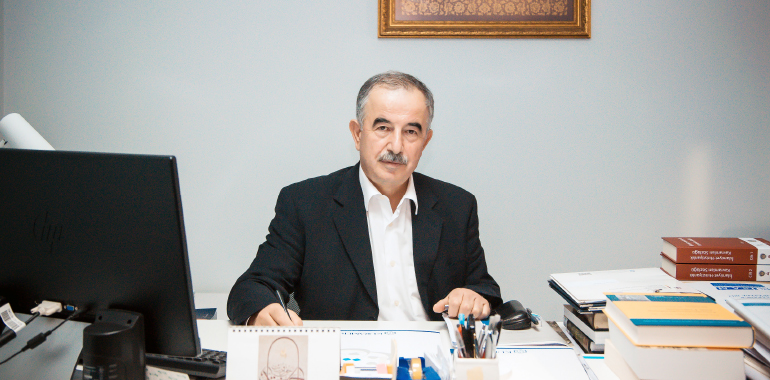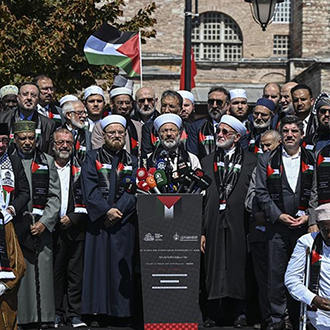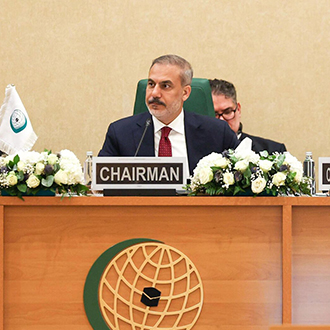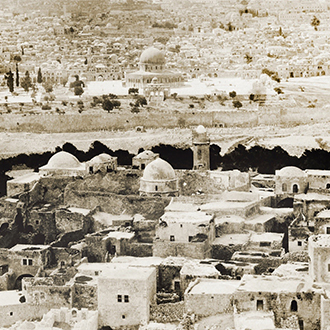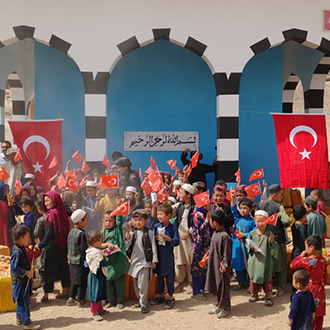In 1974, he graduated from Istanbul Higher Islamic Institute and in 1975 from Istanbul University Faculty of Law. In 1982, he became a doctor in the Department of Islamic Law and was appointed as an Assistant Professor of Islamic Law at Erciyes University, Faculty of Theology. In 1986, he became an Associate Professor. In 1994, he became a Professor. On May 28, 2003, he was appointed as the President of Religious Affairs and served in this position until 2010. He is currently the director of KURAMER (Center for Quranic Studies) within the body of Istanbul 29 Mayıs University.
There are some concepts on the basis of which the civilizations in the world appear to have been built. When we want to understand and explain Islam as a religion and civilization, one of these concepts we encounter is goodness. What is the concept of goodness in Islam, which attaches great importance to both good people and kindness?
The understanding of “goodness”, which constitutes one of the main foundations of Islamic civilization, has been built and supported by a series of concepts, such as “khayr, birr, righteous deeds, ihsan, akhlaq, taqwa, husn, mercy, ukhuwah (brotherhood), ta‘awun”. However, in to comprehend these concepts better and establish firmly their meanings in the human mind and the heart, and also reflect them on behaviors, we ought to provide a solid ground for them. To understand this, therefore, we need to look at the basic teachings of the main sources of Islam.
In the early years of Islam, as has been narrated in the hadith, Jibril came to the Prophet Muhammad and had a conversation with him in the presence of his Companions. The purpose of this conversation was to teach Muslims the three basic concepts that form the backbone of our understanding of Islam. These are iman, Islam, and ihsan. These are also the three main pillars of our religious understanding and life.
Iman is belief in Allah. Islam means obeying Allah’s injunctions and prohibitions. Ihsan, on the other hand, is the consciousness that we are under the grace and supervision of Allah at all times, and that while living with that consciousness, we constantly improve our behavior. Ihsan is the perfection of morality and piety. Ihsan comes from husn, which means beauty. The distinction between good and bad, beautiful and ugly (husn and qubh) in Islamic thought is also related to this issue. If people lose the consciousness that they are living under Allah’s supervision and control, mercy, grace, and His favor, their piety becomes shallow without going from the shell to the core.
In order to realize the feelings, thoughts and attachments that lie at the heart of the Muslim conception of goodness, we need to elaborate a little further on the Hadith of Jibril mentioned above.
Islam as religion from the Divine is a general invitation that the Creator has conveyed to humanity through His prophets from Adam to Muhammad (saw). Islam’s basic creed is built on three things: The beliefs of uluhiyyah (Divinity), akhirah (Hereafter) and nubuwwah (Prophethood). Our relationship with Allah is based on two precepts: 1) knowing Allah, i.e. ma‘rifah, 2) Debt of gratitude to Him for having been the recipient of His blessings; that is, shukr and hamd.
Iman is at the center of Islam, as it means knowing Allah (ma‘rifah), internalizing the belief that the command and rule belong to Him, living in this awareness, and having a sense of gratitude and thankfulness towards Him. Iman also means to be safe and secure under the ownership and sovereignty of the Almighty Creator. For believers, all existing things in the world are the greatest blessings, and iman is the heart’s gratitude for this blessing. However, iman is not a simple acceptance of what is happening in the inner world of individuals, but it is, and should be, the main source of strength that determines their behavior and life path, their basic values, and their priorities.
The debt of gratitude to Allah is to acknowledge that He is the One Who brought us into existence and granted us all the blessings we have, and to show all of these by our behavior. Indeed, the first verse of Surah al-Fatiha, the Opening Chapter of the Qur’an, which is recited in every cycle (rak‘ah) of the ritual prayer, is usually translated as “All praise be to Allah—Lord of all worlds”. But this sentence is better understood when elaborated as “O Lord, all my gratitude, thanksgiving, servitude, and submission are to You. Because it is You Who created us; it is You Who gave us life; it is You Who sent us into the world; it is You Who addressed us, valued us, and blessed us with countless opportunities and blessings.”
Being thankful to Allah and not being ungrateful and disbelieving is a threshold in religion, and once you cross this threshold, religion begins. The owner of the religion is Allah. We believe in Him as He has revealed it. The debt of gratitude and thankfulness to Allah should not be considered a passive confession and acceptance or a duty that can only be fulfilled by pronouncing it, but a state of consciousness that should be reflected in behavior. Therefore, we fulfill our debt of gratitude by doing what Allah commands in the way He commands and avoiding what He forbids.
To summarize, Islam is the sincere embrace and internalization of the fact that we have been created and that we are boundlessly connected to and grateful to Allah, to know how to be grateful for this existence, and to reflect this consciousness in all our behaviors is also integral part of Islam.
Not only ihsan, but also a number of concepts in our religious culture, such as taqwa, hikmah, irfan, birr, infaq, khayr, etc. also describe the perfection and essence of piety, that is, its moral aspect. Could you tell us about the moral values that constitute the characteristics of a good and beautiful person?
Moral values are the common values of society. They are not so simple, plain, and rootless that they can be defined by the individual initiatives, compulsions, and subjective evaluations of individuals. This is where religion makes an important contribution; it gives strength of morality and a spiritual foundation by confirming and affirming the common moral values of society, which have been filtered through history and are connected to the essence of being human. When we look at the hadiths of the Prophet Muhammad, we witness a series of moral values and the manifestation of these values on behaviors. This is what he must have meant when he said, “I was sent to perfect good character.” (Malik, Muwatta, Husn al-Khulq, 8) We can infer that Islam does not reintroduce common moral values but refer to them, affirm them, support them, and reinforce them.
When we talk about Islamic morality, it is not important to talk about morality per se, but to live in these grounded values that have already entered our lives. Islam considers it hypocrisy to express moral values with the most beautiful and fancy words but to act contrary to them. What is important is that moral values should take root in us and that we must internalize them and that we should consider acting contray them -even if we are alone- as detrimental as losing our humanity, dignity, and mission of creation. Moreover, it is important that these values are reflected in our lives, manifest themselves in our behavior, and bear fruit. In Islamic civilization, goodness derives its power from this essence. Indeed, not only the Islamic world but all of humanity needs such an essence and a profound channel of nourishment.
By sending the Holy Qur’an, Allah Almighty intends to give us the consciousness of doing good and being a good person. How should one read the Holy Qur’an to achieve this consciousness?
If we read the Holy Qur’an as a Book of knowledge and view the Prophet Muhammad’s Sunnah as a source of information, we cannot establish a sincere and deep connection with them at the level of consciousness. The guidance of the Qur’an and the Sunnah is essentially a light that illuminates our world of heart. We should think of Allah’s message sent to the Prophet through revelation as Allah’s call to us. We can even read the Qur’an as Allah’s special address to each of us and think, “This is what Allah wants from me”. For the Qur’an is Allah’s dialogue with us. It is not a one-sided directive. The Qur’an was revealed in a dialectical relationship with its interlocutors in 23 years, and it built a heart-bond among the Companions, who were seen as the founding generation of Islam. It was this warm bond and this very consciousness that formed the Companions’ society, and thus history witnessed a high level of human quality.
Iman, worship and ihsan, all stand at the center of piety, good morals, and virtues; and taqwa and goodness, seen as their fruits, lead ultimately to a state of consciousness rather than knowledge. Therefore, in piety, essence rather than form, intention rather than words, practice rather than knowledge are important.
In Islamic thought, the foundations of the sense of goodness and why a Muslim should do good are explained in the Holy Qur’an within the framework of the concept of “good deeds (‘amal al-salih)”. Could you tell us about the relationship between good deeds and goodness?
There are two things that the Holy Qur’an constantly states: Believe and do beneficial deeds, do good deeds, and do righteous deeds that benefit people and benefit you. There are many different translations of good deeds. But all meanings converge on the common denominator of “useful, decent, peaceful, and righteous deeds”. Faith and good deeds/useful deeds are the common denominator of all the divine religions and the summary of the religious message. You can also see faith as the more fixed or static pillar of religion and good deeds as the more variable or dynamic pillar. This is because the main line of faith has always remained the same within the tradition of revelation, while the form and details of good deeds have changed over time, even though the intention and purpose remain the same.
The concept of good deeds, which is emphasized by religion and which is broad enough to encompass all beneficial and auspicious deeds, is closely related to the concept of Sunnatullah. The religion-world balance and the concept of Sunnatullah should be urgently discussed by those who want to take lessons from all the experiences from the earliest times to the present day and from the mistakes that humanity has collectively committed, and to understand what good deeds are.
Allah created life in the world in a certain order. He ordered us to live in the world within its own rules and discover the cause-effect relationship therein, while staying on the course as guided by religion without exceeding the limits set by it. He also informed us that the life in the Hereafter depends on what we do in this world. In verse 25 of Surah al-Nur, the Qur’an explains that having a say in the world is about belief and doing good deeds: “Allah has promised those of you who believe and do good that He will certainly make them successors in the land, as He did with those before them; and will surely establish for them their faith which He has chosen for them; and will indeed change their fear into security...” Here it is about leadership and exemplarity in the good, the beautiful, and the truth in general.
Since the Companions and early Muslims understood the balance between religion and the world, and were well aware of Allah’s laws on earth, they relied on causes; they traveled to distant lands on horses or camels, carried the divine message, progressed in worldly affairs, and succeeded. This is what Sunnatullah is. When this is the case, even making a distinction between religion and the world does not make much sense. Religion, the world, reason, thought, and science are all the work of Allah’s creation and grace. Accordingly, people will be able to foresee the cause and effect relationship in the functioning of the world and foresee the consequences of every action they do; this is what it means for people to be intelligent, willful, free and responsible for their actions.
The most important condition for all deeds, favors and acts of worship to be accepted by Allah the Almighty is that they are done with pure intention and sincerity. Why is sincerity so important in religion?
What is most contrary to the nature of morality, virtue, and goodness is to practice them for vanity and worldly benefits. If the performance of a religiously required act of worship or good deed is done with the expectation of one’s being seen or heard by others, or for material gain, then sincerity ends and the act becomes worthless in religious terms. The essence of piety requires sincerity toward Allah, the Prophet, and the whole society (Muslim, Iman, 95). The Prophet stated that Allah will accept only the deeds that are performed with sincerity and for His sake alone (Nasa’i, Jihad, 24), and also said, “Verily Allah does not look at your faces and your wealth but He looks at your heart and to your deeds.” (Muslim, Birr, 34)
Our religion commands that our words and deeds should be free from any kind of ostentation and games of gain, and it also advises us to do good deeds in the hope that Allah alone will reward us. Because the hypocrites who do good deeds “so that others may see and hear” will gain nothing in this world or the Hereafter. In fact, doing good deeds not for the sake of rewards in the Hereafter, but for the sake of gaining Allah’s pleasure, is considered a high level of behavior and worship and it is the real consciousness in religious terms. Because such a behavioral quality is ultimately the product of self-respect and the effort to make one’s existence meaningful, as well as the outcome of one’s faith and trust in Allah.
In the Holy Qur’an, we often see the word ihsan used in different derivatives in relation to goodness. Allah commands us to treat our parents, relatives, and spouses with ihsan. In this respect, what is the relationship between goodness and ihsan?
Verse 90 of Surah al-Nahl, which is recited at the end of the khutbah in Friday prayers every week, states: “Indeed, Allah commands justice, grace, as well as courtesy to close relatives. He forbids indecency, wickedness, and aggression. He instructs you so perhaps you will be mindful.” This is one of the most comprehensive statements of the Qur’an concerning ihsan, good, and evil. This verse points to the unbreakable link between justice, ihsan, and doing good to relatives. People who are just, balanced, good, and virtuous always have a sense of doing good to others. On the one hand, this is a requirement of their faith and trust in Allah and the fulfillment of their debt of gratitude; on the other hand, it is also the result of their self-respect and their endeavor to give meaning to their existence.
Although it has a very wide scope, today we see that the meaning of goodness has been narrowed down to almost only material aid. Does the condition for helping require sufficient material means? Can helping be dependent on any conditions?
None of the words such as khayr, birr, infaq, tasadduq, and good deeds mentioned in the Holy Qur’an should be compressed into a narrow field and understood as “giving material aid”. All Muslims should utilize their means, knowledge, and experience to produce deeds that are beneficial to all humanity and contribute to the peace, tranquility, and security of their community and humanity, starting from their immediate surroundings. The Prophet’s statement: “(Saying) a good word is charity.” (Bukhari, Adab, 34) suggests that we should approach these concepts in a more complete and broad perspective.



